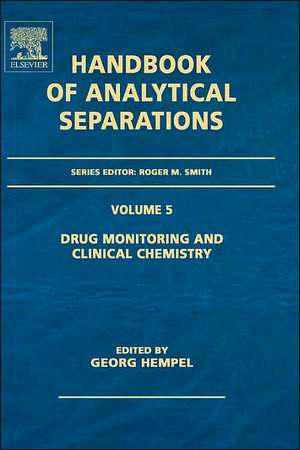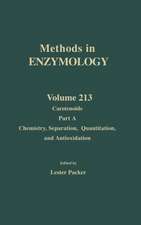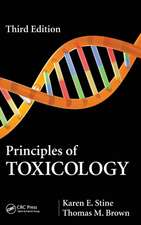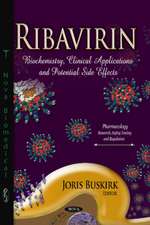Drug Monitoring and Clinical Chemistry: Handbook of Analytical Separations, cartea 5
Editat de Georg Hempelen Limba Engleză Hardback – 15 mai 2004
The book contains important information for analyst working on drug analysis in clinical chemistry, hospital pharmacists involved in therapeutic drug monitoring, other pharmacists, chemists or physicians working on pharmacokinetic studies in industry or academia.
In contrast to other books in this field, this book provides up-to-date information regarding both methodology and clinical applications. For the applications, only fields are described where therapeutic drug monitoring is used in clinical routine and provides benefit to the patients.
- Overview of all important field where therapeutic drug monitoring is applied
- All relevant analytical and computational methods are discussed
- Written by experts with a lot of practical experience in the field
Preț: 1183.86 lei
Preț vechi: 1621.73 lei
-27% Nou
Puncte Express: 1776
Preț estimativ în valută:
226.53€ • 237.15$ • 187.44£
226.53€ • 237.15$ • 187.44£
Carte tipărită la comandă
Livrare economică 07-21 aprilie
Preluare comenzi: 021 569.72.76
Specificații
ISBN-13: 9780444509727
ISBN-10: 0444509720
Pagini: 378
Dimensiuni: 165 x 240 x 22 mm
Greutate: 0.71 kg
Ediția:New.
Editura: ELSEVIER SCIENCE
Seria Handbook of Analytical Separations
ISBN-10: 0444509720
Pagini: 378
Dimensiuni: 165 x 240 x 22 mm
Greutate: 0.71 kg
Ediția:New.
Editura: ELSEVIER SCIENCE
Seria Handbook of Analytical Separations
Public țintă
Analysts working on drug analysis in clinical chemistry, hospital pharmacists involved in therapeutic drug monitoring, other pharmacists, chemists or physicians working on pharmacokinetic studies in industry or academia.Cuprins
Sample preparation for the analysis of drugs in biological fluids
Chromatographic methods for the analysis of drugs in biological fluids
Capillary electrophoresis for the determination of drugs in biological fluids
Immunoassays for the therapeutic drug monitoring and clinical toxicology
Validation of bioanalytical methods
Pharmacokinetic methods for the analysis, interpretation and management of TDM data, and for individualising drug dosage regimens optimally
Dose and therapy individualisation in cancer chemotherapy
Rationale and utility of therapeutic drug monitoring for the optimisation of antibiotic therapy
Therapeutic drug monitoring of antiepileptic drugs
Therapeutic drug monitoring of antipsychotic and antidepressant drugs
Monitoring immunosuppressant drugs
Pharmacogenomics: methodologies for genotyping and phenotyping
Applications of genotyping and phenotyping for clinically relevant polymorphisms of drug metabolizing enzymes and drug transporters
Chromatographic methods for the analysis of drugs in biological fluids
Capillary electrophoresis for the determination of drugs in biological fluids
Immunoassays for the therapeutic drug monitoring and clinical toxicology
Validation of bioanalytical methods
Pharmacokinetic methods for the analysis, interpretation and management of TDM data, and for individualising drug dosage regimens optimally
Dose and therapy individualisation in cancer chemotherapy
Rationale and utility of therapeutic drug monitoring for the optimisation of antibiotic therapy
Therapeutic drug monitoring of antiepileptic drugs
Therapeutic drug monitoring of antipsychotic and antidepressant drugs
Monitoring immunosuppressant drugs
Pharmacogenomics: methodologies for genotyping and phenotyping
Applications of genotyping and phenotyping for clinically relevant polymorphisms of drug metabolizing enzymes and drug transporters
Recenzii
"Altogether this is an important book, with many leading scientists as co-authors. It should be an important reference book for scientists, analytical chemists and clinicians working in this and related fields." --CLINICAL PHARMACOLOGY, Feb 2005
"very useful to those readers who wish to become up-to-date on recent developments and trends, as well as to those who are new-comers to the field." --AMERICAN JOURNAL OF THERAPEUTICS, 2005
"very useful to those readers who wish to become up-to-date on recent developments and trends, as well as to those who are new-comers to the field." --AMERICAN JOURNAL OF THERAPEUTICS, 2005















